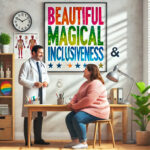Listening to the patient’s narrative can turn “hopeless” into “hope”
Listening to the patient’s narrative can turn “hopeless” into “hope”

by June Alexander
Eating disorders, particularly Severe and Enduring Anorexia Nervosa, can sound like a life sentence. Too often, it is. The Diary Healer (Alexander, 2016) illustrates it is time to listen to the patient and replace “hopeless” attitudes with “hope.”
A recovery model of patient-centered care offers hope, respect, and possibilities for people with an eating disorder, including SEAN, and my experience is that our personal diary or journal can assist in many powerful ways. To discover how journaling can help, I began a Ph.D. in 2014, which took me on an amazing literary journey. Seventy research participants accompanied me. We had not met face-to-face, but were bonded by two important factors – we each had experienced an eating disorder, and each had kept a diary. My fellow travelers had responded to an invitation posted on my blog, asking if diarists with experience of an eating disorder would like to participate in a book.
Exploring the threads
My work with these diarists formed the basis for my doctorate, investigating how diary entries can be used to write a book. The Diary Healer, as a creative work, explores diary-writing as a recording, healing and therapeutic tool, while the accompanying exegesis seeks to drill down to examine the essence of the diary genre and how it could be used to write a book.
The Diary Healer integrates the voices and experiences of the 70 respondents with my own, exploring the role and use of diary-writing as a coping, survival and healing tool. The exegesis, in describing the process of creating the book, also seeks to define the diary as a genre of writing, and investigate the use of the diary not only in literature, research, health and education, but also in the everyday lives of the individuals who have kept or keep a diary.
The diary as an accomplice
I had kept a diary throughout my 44-year “battle” with an eating disorder, from age 11 to 55, and I felt inspired to discover whether diary entries could be used to write a book exploring how diary-writing could be a tool for self-healing and renewal. Preparation for this literary mission required transitioning more fully from the practice of being a diarist to being an observer of my diaries and, subsequently, also the diaries of others. In standing back and looking in, I was shocked to discover the extent to which the diary had been an accomplice of my own illness. The two had been in collusion over many years. Yet, despite this deceit, diary-writing had helped me to function, and survive, during decades of chronic mental illness.
Helping and hindering
Moreover, with the right therapeutic intervention, the diary had helped me to re-connect with, and reconstruct, a long-suppressed true identity that was not engaged in self-delusion. My diaries had helped me to develop the ability and skills to live a full, rather than part, life. But did my healing journey have to be so long and tortuous? How much did the diary help and how much did it hinder my recovery? Could the diary have provided a more proactive role in healing? I wanted to find out.
Writing a memoir, A Girl Called Tim (Alexander, 2011), had helped to place the illness in the context of my life and to relate with others. Now I wanted to learn about the diary’s usefulness more widely, and explore its status as a literary genre. An investigation of its role in mental health care environments ensued, with a focus in the specific area of eating disorders revealing scant reference in the literature on the effect of diary-writing. As well, there was a dearth of evidence-based literature on the diary’s influence during the process of disconnection and re-connection between body and identity. I wanted to explore these findings, alongside other aspects of the diary and diary-writing.
Unearthing pitfalls and benefits
Reflection on these discoveries inspired the concept for the manuscript that became The Diary Healer. I wanted to explain the pitfalls and benefits of diary-writing and, specifically, to explore the ambivalent relationship with body and identity that could occur when experiencing an eating disorder. Furthermore, I wanted to study the role of the diary in self-healing and renewal, with the intention of combining and presenting the findings in a creative way that would stimulate reader interest.
Patient’s voice and scholar’s knowledge
Consideration of submissions, from diarists who had responded to my blog invitation, gave rise to telling the story from two viewpoints—that of diarists, and of scholars. The approach I had in mind would allow, I hoped, both myself and other people with experience of eating disorders to “speak” through the written narratives of our private diaries in this project, contextualising this alongside evidence from researchers. I also wanted to explore this technique’s effectiveness in creating a text that could offer fresh perspectives on the diary’s potential to motivate and assist healing.
My decision to take this approach stemmed from my personal experience combined with evidence from experts and scholars in the fields of psychiatry and literature.
Layers of disconnection
The information gathered indicated that when a person develops an eating disorder, symptoms manifest around food and often lead to a disconnection between body and identity (Dayal, Weaver, & Domene, 2015). The person is driven to engage in acts of bodily self-harm rather than self-love (Hodge & Simpson, 2016). Besides disconnecting the person from their sense of identity, the illness often causes the person to become disconnected from close others, including family and friends (Curry & Ray, 2010); Dayal et al. (2015); (Tantillo, 2006)). My diaries had provided a safe repository for confused feelings and thoughts that could not be shared with others during my own experience of such disconnection (Alexander, 2011).
Looking through the lens of the diarist
I wanted to know more about this but my Literature Review revealed a lack of evidence-based writings in this area. This deficit of research on keeping a diary was occurring at a time when healthcare in general is increasingly focused on evidence-based practice (Haigh & Hardy, 2011; Hurwitz, 2000) and patient narratives are gaining recognition as an effective educational tool (Haigh & Hardy, 2011; Woesner & Kidd, 2013), a method for understanding illness and improving healthcare (Hurwitz, 2000; Hurwitz & Charon, 2013; Shapiro, 2011), and for addressing healthcare provider-based stigma (Charles, 2013), illness-based self-stigma (Patrick Corrigan, Kosyluk, & Rüsch, 2013) and stigma in the wider community (Patrick Corrigan, Larson, & Michaels, 2015). I aimed therefore, for this project to provide research into diary-keeping through the lens of diarists with an eating disorder, and present possibilities for application of the diary in investigative, therapeutic and self-help ways.
To be continued next week.
REFERENCES
Alexander, J. (2011). A girl called Tim: Escape from an eating disorder hell. Sydney: New Holland Publishers.
Alexander, J. (2016). Using writing as a resource to treat eating disorders: The diary healer. Hove: Routledge.
Charles, J. (2013). Mental health provider-based stigma: Understanding the experience of clients and families. Social Work in Mental Health, 11(4), 360-375.
Corrigan, P., Kosyluk, K., & Rüsch, N. (2013). Reducing self-stigma by coming out proud. American Journal of Public Health, 103(5), 794-800.
Corrigan, P., Larson, J., & Michaels, P. (2015). Coming out proud to erase the stigma of mental illness: Stories and essays of solidarity. Collierville, Tennessee: InstantPublisher.
Curry, J., & Ray, S. (2010). Starving for support: How women with Anorexia receive “thinspiration” on the Internet. Journal of Creativity in Mental Health, 5(4), 358-373.
Dayal, H., Weaver, K., & Domene, J. (2015). From shame to shame resilience: Narratives of counselor trainees with eating issues. Qualitative Health Research, 25(2), 153-167. doi:10.1177/1049732314551988.
Haigh, C., & Hardy, P. (2011). Tell me a story — a conceptual exploration of storytelling in healthcare education. Nurse Education Today, 31(4), 408-411. doi:10.1016/j.nedt.2010.08.001
Hodge, L., & Simpson, S. (2016). Research article: Speaking the unspeakable: Artistic expression in eating disorder research and schema therapy. The Arts in Psychotherapy, 50, 1-8. doi:10.1016/j.aip.2016.05.005
Hurwitz, B. (2000). Narrative and the practice of medicine. Lancet, 356(9247), 2086.
Hurwitz, B., & Charon, R. (2013). A narrative future for health care. Lancet, 381(9881), 1886-1887. doi:10.1016/S0140-6736(13)61129-0
Shapiro, J. (2011). Illness narratives: reliability, authenticity and the empathic witness. Medical Humanities, 37(2), 68-72. doi:10.1136/jmh.2011.007328
Tantillo, M. (2006). A relational approach to eating disorders multifamily therapy group: Moving from difference and disconnection to mutual connection. Families, Systems, & Health, 24(1), 82-102. doi:10.1037/1091-7527.24.1.82
Woesner, M. E., & Kidd, C. (2013). The use of personal accounts in the study of severe mental illness. Einstein Journal of Biology & Medicine, 29(1/2), 40-45.





